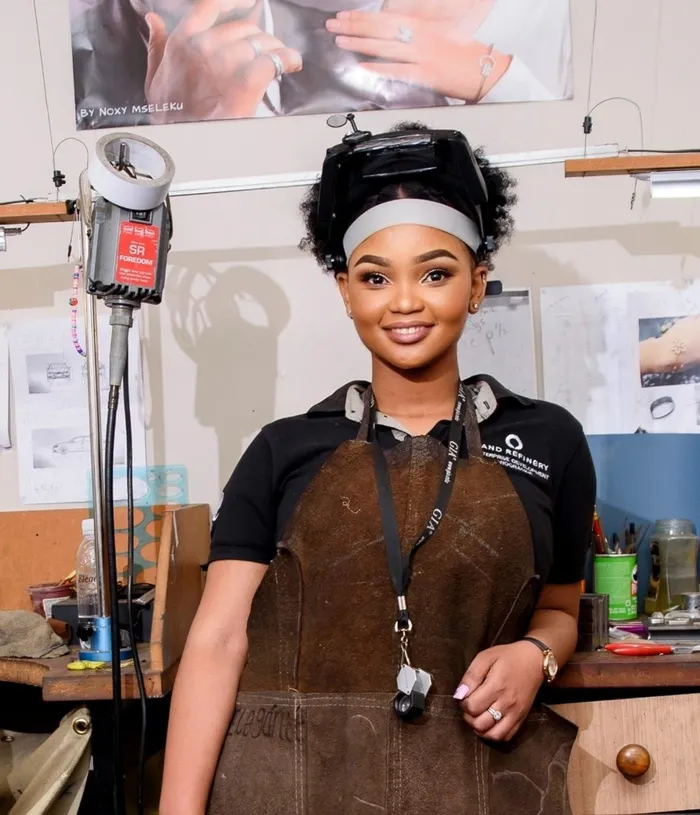Crafted for success: A jeweller's leap into leadership

Noxolo Mseleku, CEO and Founder of Elegante
Image: Supplied
WHEN Noxolo Mseleku left her home in Illovu township, KwaZulu-Natal to pursue architecture in Johannesburg, she had no idea that a rejected university application would reshape her entire career trajectory.
“Jewellery chose me, I didn’t choose it,” explains Mseleku, reflecting on how a lack of space in the University of Johannesburg’s architecture department led her to the jewellery design programme instead. “It was still about designing, drawing, creativity, so I embarked on that journey.”
Mseleku’s natural artistic flair – evident since childhood when she made clothes for herself and her cousins – found new expression in precious metals and gemstones. Her talent quickly emerged during her university years, culminating in a competition-winning piece that interpreted HIV and AIDS through a dying flower with a healthy infant at its centre, symbolising hope and resilience.
Her dedication earned her a scholarship to study in Italy for two years (2015–2017). During this period, she also completed a diamond grading course at HRD in Antwerp, broadening her expertise in gemstones. “I am definitely a sucker for romance and beautiful things, but what inspires me most is gemstones,” she says.
Returning to South Africa, Mseleku briefly worked for Browns before launching her own company, Elegânté. The Italian name, meaning “elegance,” reflects both her international education and design philosophy of creating “classical pieces with a twist of modernity.”
However, she soon discovered that opportunities for qualified jewellery designers were scarce, with many of her university peers leaving the industry entirely. Rather than follow suit, she decided to create opportunities herself. “I decided to be the change I want to see,” she says.
The transition from creative designer to business owner required Mseleku to develop entirely new skills beyond her artistic expertise. “I’m a creative at heart,” she says. “But because I have a brand now, I have to bring in some business elements.”
The evolution from pure creativity to business leadership became one of her greatest challenges and learning experiences.
Today, Elegânté employs three young skilled professionals who focus on design and manufacturing while Mseleku has learned to step back from the workbench.
“They do the design and manufacture, and I do everything else – the sales and marketing,” she explains. This allows her team to concentrate on their technical expertise while she focuses on growing the business.
All of this would have not been possible without the intervention of the De Beers Enterprise Programme. It’s a programme that is a multifaceted initiative focused on supporting and developing businesses, particularly those in the diamond and jewelry sector. It provides a range of support services, including mentorship, training, and access to resources, to help businesses scale sustainably and contribute to the local and global diamond economies.
One of the most significant lessons from the De Beers programme has been learning to build business structures that function independently. “The business needs to function even when I’m not there,” Mseleku emphasises. This shift from being indispensable in every aspect of production to becoming a strategic leader who empowers her team has been crucial to Elegânté’s growth.
The business has participated in numerous international exhibitions, including trade missions to Singapore, where she plans to establish her first international retail outlet. Her impressive track record also includes achievements such as being in the top 10 for PlatAfrica in 2023, winning the Rand Refinery Enterprise Development competition in 2021, and receiving an award from the Department of Minerals and Resources and Energy for upcoming entrepreneurs in the industry.
Currently participating in the De Beers Group’s Enterprise Development Project, Mseleku has refined her business approach significantly. Previously, she admits, she did “everything under the sun,” which proved time-consuming and unprofitable. The programme taught her to focus and establish proper business structures, helping her understand what she should – and shouldn’t – be doing.
Looking ahead, Mseleku plans to return to retail within five to 10 years, having previously operated a store that closed due to COVID-19 and location challenges. Her vision includes multiple branches, a larger workshop and more employment opportunities for fellow creatives.